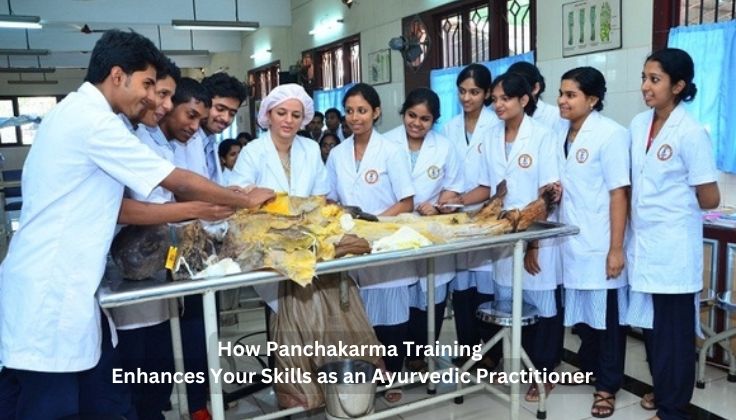How Panchakarma Training Enhances Your Skills as an Ayurvedic Practitioner

Ayurveda, the ancient science of life, has been practiced for thousands of years as a holistic system of healing for the balanced state of mind, body, and spirit, which, in turn, focuses on the use of natural remedies, lifestyle modifications, and detox therapies to help restore health and well-being. Several detox therapies in Ayurveda have historically stood the test of time; one of the profound detoxification therapies is Panchakarma, five purification procedures designed for the detoxification of the body and bringing about a restoration of overall health.
Ayurvedic practitioners would stand to benefit greatly from becoming a student of Panchakarma. Alliances of study in this field deepen theoretical knowledge and build diagnostic skill in a way that will enhance treatment and career opportunities. Whether you are an aspiring Ayurvedic practitioner or an experienced one, this Panchakarma course online will equip you with the important skills required to help you provide deeper healing to your clients.
Skills required for an Ayurvedic Practitioner
Deepening Theoretical Knowledge
Panchakarma is not just a set of treatments; it is a carefully structured detoxification process based on Ayurvedic principles. A comprehensive training program helps practitioners understand the philosophy behind these therapies and their role in restoring health.
Each individual has a unique prakriti, or body constitution, and vikriti, the current state of imbalance. Training helps practitioners assess these aspects and determine the right Panchakarma procedures for different conditions. The five main therapies—vamana, virechana, basti, nasya, and raktamokshana—are studied in-depth to understand their indications, contraindications, and benefits.
Additionally, practitioners learn about snehana and swedana, preparatory processes that enhance the effectiveness of detoxification. This deep theoretical grounding ensures that Ayurvedic professionals can make well-informed decisions in their practice.
Practical Hands-on Experience
While theory is crucial, Panchakarma is a hands-on science. Practical training provides an immersive learning experience, allowing practitioners to develop expertise in administering therapies with precision and care.
Under expert supervision, trainees perform each Panchakarma therapy, ensuring they understand the nuances of treatment techniques. For example, in basti therapy, the practitioner learns the right way to administer medicated oils or decoctions through enema, considering factors like dosage, timing, and patient comfort. In nasya therapy, they practice administering herbal oils or powders through the nasal passage to clear toxins and improve respiratory and neurological health.
This hands-on training builds confidence in handling real-life cases, improving not only technical skills but also the ability to provide a comfortable and safe experience for patients.
Enhancing Diagnostic Skills
A key aspect of being a proficient Ayurvedic practitioner is the ability to accurately diagnose imbalances in the body. Panchakarma training sharpens these diagnostic skills by teaching practitioners to assess patients holistically.
During training, students refine their ability to read nadi pariksha, or pulse diagnosis, jihva pariksha, tongue examination, and overall prakriti-vikriti analysis. They learn to recognize early signs of toxin accumulation, or ama, and understand how various factors like diet, lifestyle, and emotions contribute to imbalances.
With this enhanced diagnostic ability, practitioners can tailor Panchakarma treatments to suit individual needs rather than using a one-size-fits-all approach. This personalized care leads to better treatment outcomes and higher patient satisfaction.
Expanding Career Opportunities
Panchakarma expertise opens up a world of professional opportunities. With rising interest in holistic wellness, detox therapies, and natural healing, Ayurvedic practitioners trained in Panchakarma are in high demand.
Many Ayurvedic clinics, wellness retreats, and integrative health centers worldwide seek skilled Panchakarma therapists to offer specialized detox programs. Additionally, with the increasing recognition of Ayurveda in the West, the Middle East, and parts of Asia, practitioners trained in Panchakarma have the chance to work internationally.
Beyond clinical practice, trained professionals can also teach Panchakarma courses, conduct workshops, and contribute to research in Ayurvedic detoxification therapies. Some may even start their own Ayurvedic wellness centers, offering Panchakarma retreats and personalized healing programs.
Integrating Panchakarma into Holistic Healing
Panchakarma is most effective when combined with dietary guidance, yoga, herbal remedies, and lifestyle modifications. Training helps practitioners integrate these complementary therapies into their practice, ensuring a well-rounded healing approach.
For instance, after a Panchakarma detox, patients are guided through a rasayana, or rejuvenation phase, which includes herbal formulations, restorative yoga, and mindful eating practices to sustain the benefits of detoxification. Ayurveda teaches that detoxification is not just about eliminating toxins but also about nourishing and strengthening the body post-treatment.
Additionally, with modern research supporting the efficacy of Panchakarma in conditions like autoimmune disorders, digestive issues, chronic stress, and metabolic diseases, Ayurvedic practitioners can integrate traditional wisdom with contemporary wellness trends to offer innovative healing solutions.
Panchakarma training is an invaluable investment for any Ayurvedic practitioner looking to deepen their knowledge, refine their skills, and expand their career opportunities. It provides a strong foundation in detoxification therapies, enhances diagnostic precision, and equips practitioners with hands-on expertise to offer personalized healing solutions.
As the world increasingly turns to Ayurveda for natural and holistic healthcare, Panchakarma-trained practitioners will play a crucial role in bridging traditional healing with modern wellness needs. By mastering these ancient therapies, Ayurvedic professionals not only enhance their practice but also contribute to the global movement toward holistic well-being.
For those committed to delivering authentic and effective Ayurvedic care, Panchakarma training is more than just an educational pursuit; it is a transformative journey that refines both personal and professional growth. If you are looking for a Panchakarma Course in Kerala, get in touch with School of Ayurveda where we offer good quality education.